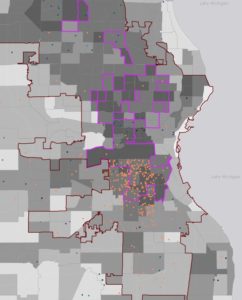Public officials across the nation are discovering that HUD’s new Affirmatively Furthering Fair Housing rule jeopardizes local zoning control.
HUD is scrambling to deny this with befuddling information.
– The Federal Register says, “[AFFH] does not impose any land use or zoning laws on any government.”
– A recent article in Urbanland, the magazine of the Urban Land Institute, defends AFFH. Its author quotes HUD’s Gustavo Velasquez…
“…opponents of AFFH “keep making this zoning argument that AFFH is about rezoning or imposing zoning provisions on local jurisdictions,”
– HUD contends they leave planning and zoning to local communities. AFFH is merely a “planned framework” that provides “nationwide uniformity and consistency for fair housing.”
In spite of this absurdly contradictory statement, many local officials, hesitant to forego HUD grants, find the lines tempting.
How can HUD deny they control local zoning when the evidence proves the opposite?
Easy. At first glance, the Federal Register appears definitive. The “agency does not impose any land use or zoning laws…” But, that all changes later in the ruling…
“It is important to note, however, that while zoning and land use are generally local matters, when local zoning or land use practices violate the Fair Housing Act, they become a Federal concern…” Federal Register July 16, 2015
The ‘catch’ for communities is that HUD places no clear limits on what constitutes violations of the Fair Housing Act.
Today a fair housing violation can be anything from a “concentrated area of poverty” to refusal to “economically integrate” upscale neighborhoods, regardless of the number of affordable homes built.
Even HUD’s definitions of “discrimination” and “exclusionary zoning” are moving targets as we learned from Westchester County.
The New York community has become the on-going incubator for HUD’s anti-local zoning campaign. Initially, HUD tried and failed to prove the jurisdiction guilty of discrimination.
Undeterred, they then accused the county of “restrictive zoning” practices. But, two independent legal studies showed otherwise. Westchester based their zoning on safety and constructed homes by virtue of economics, not people. Anyone can buy a home anywhere in the county as long as they can afford the payments. In fact, studies proved the county one of the most diversified in the state.
When that failed, HUD re-defined “restrictive zoning” to include economic considerations. This time they successfully argued the county failed to “economically integrate” their towns. As Stanley Kurtz proves in a recent article, economic integration has no legal basis in the Fair Housing Act.
That did not stop HUD. “Economic integration,” a policy that forces communities to build affordable housing in affluent areas or face discrimination charges, is now fundamental to HUD’s “planned framework” of uniformity and consistency.
In Velasquez’ words, opposition to AFFH is based on a…
“misconstrued, misguided argument that is not really what the rule is attempting to do.”
Yet agency letters to Westchester show that HUD can consider “size of lots, size of a development and the number of bedrooms” restrictive zoning practices
There is no “misconstruing” what HUD has already done to zoning in communities like Westchester County, NY and Marin County, CA. Local zoning control may not be what the agency “is attempting to do,” but it is precisely what it accomplishes.
Here is how the agency controls local zoning:
– First, HUD requires each applicant for CDBG and other grants, to complete an Assessment of Fair Housing, to identify all “contributing factors” to discrimination.
– Next, the applicant submits a plan to HUD detailing how they will eliminate the “contributing factors” and foster integrated, balanced lifestyles.
– Then, HUD can accept the plan, ask for modifications or reject it. If accepted, the jurisdiction receives funding and begins plan implementation.
This sounds straightforward. But, there is a ‘catch.’
– AFFH requires that civil rights groups, affordable housing developers and/or other civic activist organizations participate in creating the plan that defines and resolves potential areas of discrimination.
– The applicant also signs an agreement to take no actions “materially inconsistent with its obligation to affirmatively further fair housing.”
If the community receives the grant money and decides to ignore one potential area of discrimination because of current zoning restrictions or voters’ choices, and instead focus on another, they are now vulnerable to lawsuits for failure meet their obligation to AFFH.
So, while HUD does not directly control local zoning, acceptance of the grant money obligates local officials to take whatever actions are necessary to meet HUD’s demands, including ignoring or changing their own zoning laws.
– Once accepting the money, any one of these activist groups can sue the community for failure to affirmatively further fair housing. When the Westchester case settled, a 2-person civil rights group that sued received $7.5 million.
In other words, there is a perverse financial incentive for citizens to sue local communities that do not, where necessary, modify zoning and land use to accommodate HUD’s erratic and continually expanding definitions of discrimination, segregation and Fair Housing.
As Michael Allen of the law firm of Relman, Dane and Colfax, one of the nation’s leading experts on AFFH explains, “it [AFFH] does provide a foundation on which civil rights advocates can build anti-segregation campaigns at the local level.” He goes on to say this will require “organizing by the national fair housing advocacy organizations…; and lawyers prepared to bring enforcement actions.” This trigger of lawsuits is the key that makes AFFH work.
Until the Westchester case, HUD had no efficient method to enforce their regulations nationwide. Now that they do, the agency is increasing their demands on communities well beyond any obligations set forth in the Fair Housing Act.
If you accept HUD grants, and fail to obey the agency, no matter how extreme their demands may be, your community is exposed to withdrawal of the grant funds or massive lawsuits. That is how HUD controls local zoning.
The above information courtesy of John Anthony, Founder of Property Value Defense

